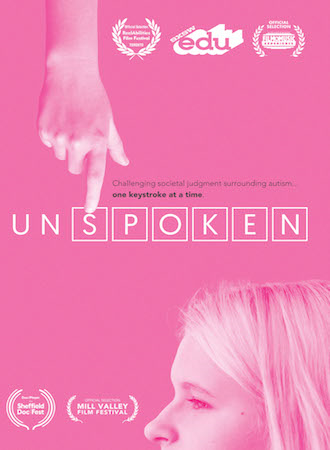
Unspoken 2019
Distributed by The Video Project, 145 - 9th St., Suite 102, San Francisco, CA 94103; 800-475-2638
Produced by Geneva Peschka
Directed by Emma Zurcher-Long, Julia Ngeow, and Geneva Peschka
Streaming, 26 mins
College
Communication; Language Disorders; Speech Disorders
Date Entered: 02/12/2020
Reviewed by Kimberly Poppiti, St. Joseph's College, Patchogue, NYUnspoken is a short documentary focusing on the unique communication style of Emma Zurcher-Long, a self-described “autistic girl.” The film opens with a series of brief scenes from (what seem to be) the home movies of Zurcher-Long family. These begin with mother, father, and brother welcoming the newborn Emma; from here, a concise overview of Emma’s apparently nonverbal childhood is presented through a brief montage, bringing viewers up to the present day, with Emma Zurcher-Long at age fourteen.
Emma’s communication skills at first appear to be rudimentary, and her efforts almost completely nonverbal, but it is soon revealed that she can communicate both effectively and articulately when “speaking” through words that she types on a keyboard held by her mother. Viewers quickly learn that Emma, while she presents in a way that many might interpret as quite limited and barely verbal, actually has had the capacity for advanced thought and comprehension, along with verbal expression and effective communication from a young age. These abilities were not fully recognized – even by family members - until she worked with Soma Mukhopadhyay, the originator and developer of the communication system known as the Rapid Prompting Method (RPM), which seeks to enhance the communicative abilities of users.
RPM allows her to type, rather than speak, her thoughts. Once freed to communicate in this way, Emma is revealed as articulate, funny, and intelligent; viewers can easily imagine how frustrated she may have felt prior to this. This aspect of Emma’s story is reminiscent of those of the subjects of other documentaries about nontraditional communication styles, including: Latest News from the Cosmos and Far from the Tree.
As Emma describes her condition, “My body does not obey my mind […] the beauty of my mind is often ignored by my difficult body that is very childlike in movement.” She clarifies this disconnect by saying, “There is not a direct line between my brain and my mouth. It’s more like an elaborate maze.” Emma helps viewers connect these dots and understand how her “childlike movement” creates a false impression by saying: “Silliness is acceptable in those who are believed smart but for those like me it indicates stupidity.” Later in the film, Emma assures viewers, “I want to tell you that I am capable, daring massively, eager to prove my intelligence. I will work tirelessly so that the autistic children younger than me won’t be doubted the way I am.”
Emma’s eloquence and purpose, as illustrated above, are the backbone of Unspoken. Beyond this, the strengths and weaknesses of the film are both related to its brevity. The sub-thirty minute running time allows for the entire film to be screened during a single class period or course session, making it well-suited to classroom use and also relatively easy for even busy viewers to sit down and watch; the downside of this conciseness is that the short timeframe, by necessity, limits what can be included. Viewers, especially those unfamiliar with autism-related communication challenges, may finish Unspoken wishing for a bit more information than that which is provided and, specifically may desire more details about how Emma developed her communication skills to connect with others and how RPM helped with this process.
All in all, Unspoken is worth viewing. It provides a fascinating glimpse into a unique style of communication and engages viewers effectively by allowing the protagonist/subject to speak for herself, with the support of family members. This film contains no objectionable material. It is inspirational and enlightening. It will likely be most relevant to those in the fields of communication studies, speech language pathology, autism studies, and special education.
Awards
ZUKOR Award Winner, Astoria NY Film Festival; Positive Images in the Media, TASH Film Festival